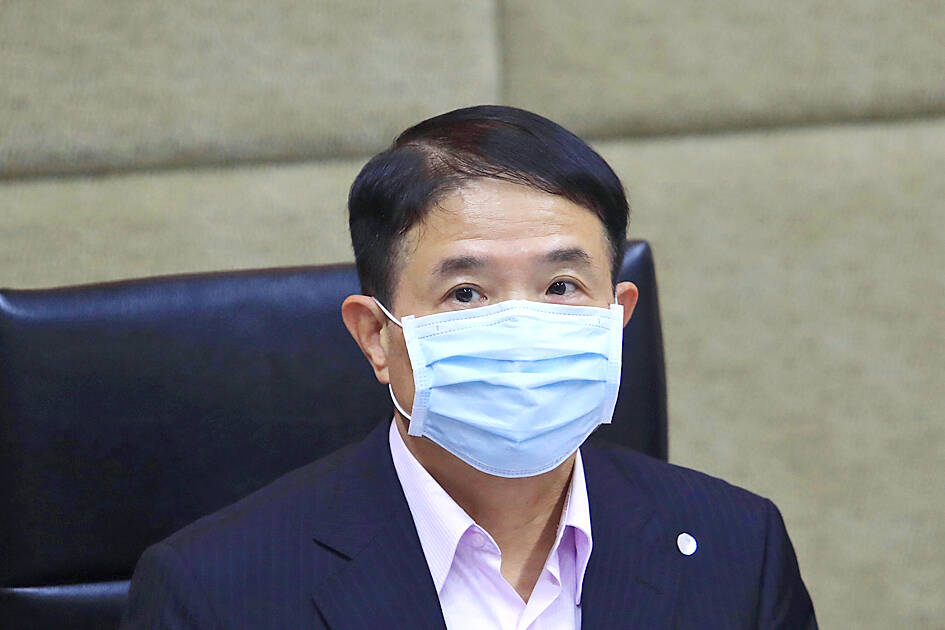The National Communications Commission (NCC) would not intervene in the production and planning of television news coverage of political candidates running in the nine-in-one local elections in November, NCC Vice Chairman Wong Po-tsung (翁柏宗) said yesterday.
Wong was responding to criticism from former Tainan County commissioner and Taiwan Renewal Party Taipei mayoral candidate Su Huan-chih (蘇煥智), who on Monday said that several TV networks were focusing only on the three major candidates in the Taipei mayoral election.
Su said he would sue the networks for contravening the Civil Servants Election and Recall Act (公職人員選舉罷免法), as well as the NCC for failing to supervise the stations.

Photo: CNA
“While TV stations can produce and broadcast programs based on their own broadcasting guidelines and code of ethics, for mayoral elections, they should follow Article 49 of the act during the 15-day campaigning period leading up to the election,” Su said. “We will work with the Central Election Commission to ensure that broadcast media comply with election regulations.”
Under Article 49, TV stations are required to cover political candidates fairly. Broadcast media contravening the article are subject to a fine of between NT$200,000 and NT$2 million (US$6,433 and US$64,334).
Twelve candidates are running for Taipei mayor, with former minister of health and welfare Chen Shih-chung (陳時中) of the Democratic Progressive Party, Chinese Nationalist Party (KMT) Legislator Chiang Wan-an (蔣萬安) and independent candidate Vivian Huang (黃珊珊) among the front-runners.
Su said that Chinese Television System (CTS), Public Television Service, Formosa Television, TVBS and SET News had contravened Article 104 of the act, which prohibits spreading rumors or false information, or attempting to help a candidate win or lose an election.
He said he would today protest outside the CTS building and ask the network to invite him and all Taipei mayoral candidates to a debate.
“Formosa TV told me that it can only invite candidates from major political parties or those with high approval ratings to a televised debate due to the limited time and resources it has,” he said. “However, it is only legal and reasonable if all candidates in the Taipei mayoral election are invited. Inviting all candidates to a debate is feasible, as evidenced by cases in other countries.”
Neither poll results nor party affiliation should be used as justification for deciding which candidates to cover or who to invite for televised debates, he said, adding that it is the discriminatory practices of broadcast media that lead to discrepancies in approval ratings.
In addition to addressing the biases of TV networks, the NCC should quickly stipulate broadcast guidelines for campaign news coverage to ensure the fairness of the election.
Separately, Wong said that Huang’s pledge to establish an online public policy discussion forum if elected could be unconstitutional if it uses a real-name system.
Huang said the online platform would allow Taipei residents to propose policies directly to the city government.
Using a real-name system would ensure that real people participate in discussions on issues facing the city, she said, adding that the forum would not collect personal data.
This helps foster an environment in which people are responsible for their own public statements, she said.
“I suggest that the candidate look at the example in South Korea, where a real-name system was ruled unconstitutional in August 2012,” Wong said. “Adopting a real-name system in an online forum could impede freedom of speech, which was not won easily in Taiwan, and thus requires extensive discussion.”

CAUTION: Based on intelligence from the nation’s security agencies, MOFA has cautioned Taiwanese travelers about heightened safety risks in China-friendly countries The Ministry of Foreign Affairs (MOFA) yesterday urged Taiwanese to be aware of their safety when traveling abroad, especially in countries that are friendly to China. China in June last year issued 22 guidelines that allow its courts to try in absentia and sentence to death so-called “diehard” Taiwanese independence activists, even though Chinese courts have no jurisdiction in Taiwan. Late last month, a senior Chinese official gave closed-door instructions to state security units to implement the guidelines in countries friendly to China, a government memo and a senior Taiwan security official said, based on information gathered by Taiwan’s intelligence agency. The

The National Immigration Agency (NIA) said yesterday that it will revoke the dependent-based residence permit of a Chinese social media influencer who reportedly “openly advocated for [China’s] unification through military force” with Taiwan. The Chinese national, identified by her surname Liu (劉), will have her residence permit revoked in accordance with Article 14 of the “Measures for the permission of family- based residence, long-term residence and settlement of people from the Mainland Area in the Taiwan Area,” the NIA said in a news release. The agency explained it received reports that Liu made “unifying Taiwan through military force” statements on her online

Taiwan Semiconductor Manufacturing Co (TSMC), the world’s largest contract chipmaker, said yesterday that it is looking to hire 8,000 people this year, at a time when the tech giant is expanding production capacity to maintain its lead over competitors. To attract talent, TSMC would launch a large-scale recruitment campaign on campuses across Taiwan, where a newly recruited engineer with a master’s degree could expect to receive an average salary of NT$2.2 million (US$60,912), which is much higher than the 2023 national average of NT$709,000 for those in the same category, according to government statistics. TSMC, which accounted for more than 60 percent

Tung Tzu-hsien (童子賢), a Taiwanese businessman and deputy convener of the nation’s National Climate Change Committee, said yesterday that “electrical power is national power” and nuclear energy is “very important to Taiwan.” Tung made the remarks, suggesting that his views do not align with the country’s current official policy of phasing out nuclear energy, at a forum organized by the Taiwan People’s Party titled “Challenges and Prospects of Taiwan’s AI Industry and Energy Policy.” “Taiwan is currently pursuing industries with high added- value and is developing vigorously, and this all requires electricity,” said the chairman